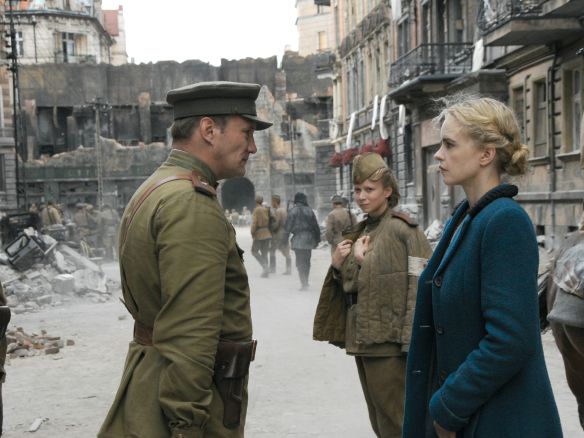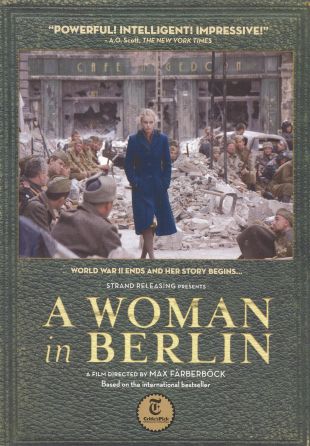
The devastation surrounding World War II Europe continues to provide limitless fodder for feature melodramas, and directors have crisscrossed this period of history dozens of times, often to maximum emotional impact. So it feels a bit astonishing when a motion picture unearths an aspect of the Second World War rarely covered by mainstream film. Recalling Marcel Ophüls's The Sorrow and the Pity (1971), Max Färberböck's fascinating period drama A Woman in Berlin does exactly that: it introduces its viewers to a phase of the tumult given little cinematic attention elsewhere. Färberböck travels to a Berlin slum circa 1945, just outside of the Reichstag, in the days immediately preceding Hitler's suicide. Working from a screen adaptation of a young German woman's published journal that the German government banned for years (for political reasons, she feared disclosing her identity and tagged herself as "Anonyma"), the co-writer-director dramatizes the events surrounding the Soviet invasion of eastern Germany, which ultimately led up to the creation of the DDR. At the film's center stands the young author of the diary and the narrator of the tale (Nina Hoss) -- a comely, genial, and well-to-do young woman who, at the story's outset, also just happens to pledge allegiance to Adolf Hitler.
Färberböck spends the first third of the film bombarding the audience with nonstop barbarous calamity. The Russians (initially perceived by some Germans as saviors from the iron thumb of fascism) roll into Berlin like hordes of savages, brandishing tanks, grenades, and automatic weapons, annihilating any malcontents, and brutally raping every woman in their path. The protagonist herself endures so many back-to-back instances of sexual abuse that one loses count. The onslaught eventually drowns out any palpable horror and anesthetizes the viewer. As time rolls on, Anonyma begins deliberately and conscientiously searching for an out -- a human connection to provide some form of deliverance from this cesspool.

The most intriguing and potentially controversial aspect of the film is that it features a Nazi as not only the main character, but someone with whom we ultimately empathize. One of the keys to this sympathy lies in Anonyma's politically embryonic state. One may be inclined to distance oneself from her on an emotional level by virtue of her political ties, but over the trajectory of the narrative, the young woman drops small insights into her naïveté about the evil surrounding her -- we witness her shock, for example, upon learning that Hitler's armies have massacred the youth of a Russian village. Färberböck charts her burgeoning loss of innocence, and draws on it to lay down sympathy as the foundational material for an emotionally rich substory that grows organically out of the apocalypse -- as Anonyma and a Russian officer, Andreij Rybkin (Yevgeny Sidikhin), find themselves pulled inexorably together by circumstance. Their falling in love occurs so subtly that the progression feels imperceptible; Färberböck wisely resists overmodulation, romantic clichés, and even excessive physical contact between the partners, recognizing that the core of this deeply spiritual need for each other lies elsewhere. One of his real masterstrokes involves an initial encounter between the two lovers-to-be, in a semi-vacant apartment. Following multiple rapes that Anonyma endures from various men, she expects Andreij to throw her down and force himself upon her, and projects these expectations by automatically removing her top; Rybkin reveals his integrity and his inherent respect of her by refusing to respond to this gesture.

As moving and persuasive as this cross-cultural love story feels, Färberböck resists limiting his focus to this one area; instead, he expands his gaze beyond the confines of the central relationship and begins unveiling small strands of other temporary connections that the odd circumstances of the invasion have wrought. One walks away wanting to learn more about the peripheral characters and situations, such as a young soldier who takes residence in an ailing fräulein's apartment and tends to her needs (only to run headfirst into violence when a Russian brute decides to barge in and take advantage of the woman's ill state), and another substory about a woman who resists involvement with a Russian soldier by virtue of ambiguous ties to another man -- ties that reveal themselves only gradually. Often, we only catch the faintest and most delicate hints of these fascinating substories -- faint enough that Färberböck's film would benefit from extensions of the many additional narrative threads that seem to lurk just beneath the surface of this dramatic landscape, but feel somewhat underdeveloped.

A narrative expansion might seem an absurd suggestion given the fact that over-length is one of the film's key weaknesses, but this only feels problematic for the first 40 minutes or so. As it stands, the initial devastation rolls on so inexorably that it risks deadening the viewer. Ultimately, however, the film more than bounces back, and recaptures the audience's emotional attention with the central love story. If Färberböck had tightened the first act and broadened some of his later substories, he could easily have produced a masterpiece. What is onscreen does succeed admirably, though, thriving on the basis of Anonyma's intriguing evolution as a politicized figure and the tale's overarching emotional richness.
